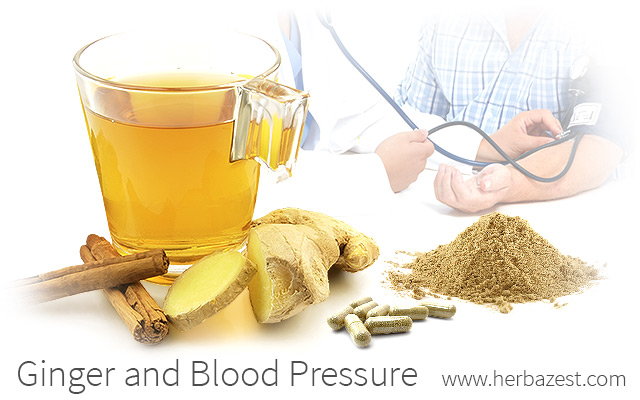High blood pressure, also known as hypertension, does not usually have any signs or symptoms, but it can be diagnosed by having your blood pressure monitored. Blood pressure readings that are consistently 140/90 or higher indicate hypertension and a greater risk of heart attack, stroke, and even heart and kidney disease.
There has been much interest in using natural remedies for treating hypertension. Scientific research have begun to expose ginger effects on blood pressure, but much is still unknown about the mechanism of action that allows ginger to actually control hypertension.
High Blood Pressure - Causes and Triggers
There is no single cause of high blood pressure, but your lifestyle can have a huge impact on your likeliness of developing it. The following are risk factors for developing high blood pressure:
- Eating too much salt
- Not eating enough fruit and vegetables
- Being overweight
- Lack of exercise
- Drinking too much alcohol
High blood pressure can also have genetic causes or can even be a side effect of certain prescription medicines.
Ginger's Effect on Blood Pressure
Ginger can be used to improve blood circulation and relax the muscles that surround blood vessels. In animal models, studies have found that ginger's blood pressure-lowering effects are mediated by voltage-dependent calcium channels. For example, certain dosages of ginger extract have been associated with a fall in the arterial blood pressure, as well as with a decrease of muscle contractions. However, studies are inconclusive and further research is necessary to corroborate this benefit of ginger.
Taking Ginger for Blood Pressure
It is important to consider ginger side effects and interactions before start consuming it for medicinal purposes. Because ginger may lower blood pressure, it is not recommended to take it with high blood pressure medications, as it may raise the risk of developing low blood pressure and irregular heartbeat. Eating fresh, raw ginger, as well as consuming dried ginger, drinking ginger tea, or taking ginger supplements, are all effective ways of reaping its hypotensive properties. However, it is not recommended that adults consume more than four grams of ginger a day in any form. Pregnant women should not consume more than one gram of ginger a day.
Ginger vs. Other Herbs for Blood Pressure
Though ginger has a number of beneficial medicinal uses, and research suggests that it may have hypotensive effects, other herbs, such as garlic, are better suited to lowering blood pressure. Garlic is thought to aid in nitric oxide production, which results in smooth muscle relaxation and vasodilatation. Garlic has been linked to a decrease in blood pressure in patients with increased systolic pressure. Much research has shown garlic to have beneficial cardioprotective uses in addition to its hypotensive effects.
Oftentimes, high blood pressure is a result of unhealthy lifestyle choices, and by simply changing the way you eat or the amount you exercise, your blood pressure can be lowered. However, many natural herbs have been shown to have blood pressure-lowering effects. Since much is not yet known about the effects of ginger on blood pressure, you can include it in your diet, in combination with other herbs with hypotensive properties, in order to improve your cardiovascular health.
Sources
- Blood Pressure Association - U.K., What is high blood pressure?
- Herbal Medicine: Biomolecular and Clinical Aspects, Chapter 7, The Amazing and Mighty Ginger
- International Journal of Medicine and Medical Sciences, Blood pressure lowering and cardio-protective effects of garlic (Allium sativum) and ginger (Zingiber officinale) extracts in some laboratory animals, 2015
- Journal of Cardiovascular Pharmacology, Ginger Lowers Blood Pressure Through Blockade of Voltage-Dependent Calcium Channels, 2005
- Journal of Pharmacy Research, A review on Pharmacological and Phytochemical Properties of Zingiber officinale Roscoe (Zingiberaceae), 2011
- National Institutes of Health, Causes of High Blood Pressure
- Medicinal Plants of the World, p. 349
- University of Maryland Medical Center, Ginger
- Pharmacognosy Reviews, Role of natural herbs in the treatment of hypertension, 2011




